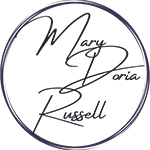Now and then, I get email that says, in essence, “Write faster, damn you! I’m gonna die soon!” That message came most recently from Rebecca Chaitin, of blessed memory. Becca was a fan who became a friend. She didn’t share a lot of detail about her health, but I knew she had cancer and that the prognosis was poor.
None of us know how we’ll react when we face a killer; I like to think that I’d behave as Rebecca Chaitin did. After giving chemo a fair chance, she chose palliative care over additional aggressive treatment — because she wanted more life, not a longer death. She spent her final eighteen months traveling to beautiful places, eating good food, and laughing with those she loved. She died in character, on her own terms.
Becca was a copy editor by nature and by profession, and she was one of those acknowledged at the end of Doc for close reading and sensitive criticism of the manuscript. After Doc went to press, she nagged me to write about Tombstone and cheered when I finally agreed that I had something to add to the canon. She last saw The Cure For Anger in October, when the manuscript was about half-complete. When she returned her comments to me, she added, “Write faster, damn you!” She died a few days later.
In the movies, there’s often an agent or an editor or a publisher who pushes a fictional author to buckle down and finish that manuscript. This does not happen in real life — as far as I know — and for me that’s a good thing. I do not work better on deadline. Particularly at the beginning of a novel, I’m feeling my way, character by character, into the story. I need time to get to know these people, to see a world through their eyes, to learn what they would know and imagine how they would feel and react as the plot unfolds.
I edit obsessively, but I also do a lot of revision while writing the first two-thirds of a story. After 5.6 novels, I now know that what happens on page 398 depends on what happened back on page 32. The earlier chapters have to be solid and correct, but if I’ve done my job properly with the first two-thirds of a novel, the last third feels inevitable. The momentum builds. The driver for completion is entirely internal. I wake up twice a night to scribble notes in the dark. At 4:30 in the morning, I stop pretending that I’m going to fall asleep again, and start the day with Wyatt and Virgil and Johnny Behan and Luther King and Buckskin Frank Leslie in my head.
At this point in the process, I become obsessed with word count. My goal for each day is 500 words, minimum. If things are going well, I can double that in a day’s work. A day’s work is defined as what I can do in four hours. Going all the way back to grad school in the 1980s, four hours of intense mental effort is all I’ve ever been able to sustain in a day. After that, I can do laundry or bake bread or work on a needlepoint pillow for a friend, but my brain is squeezed dry.
There’s nothing magical about 500 words. It’s just a yard stick. Now that I’m working on the final third of the manuscript, I often fly past it, doubling the count. Other days, it takes real discipline not to give up and walk away after 250 words. When I hit 500, I can either leave the office with a clear conscience or stay on and get a little further in the story.
For scale: THIS is the 613th word of this blog entry. It took an hour to write, and I did it after racking up 1013 words for the book. I spent an hour editing this: cut 150 words from the first draft, moved two paragraphs, and let it sit overnight before editing again. Now I’m going to click PUBLISH, and get back to work on Tombstone!
